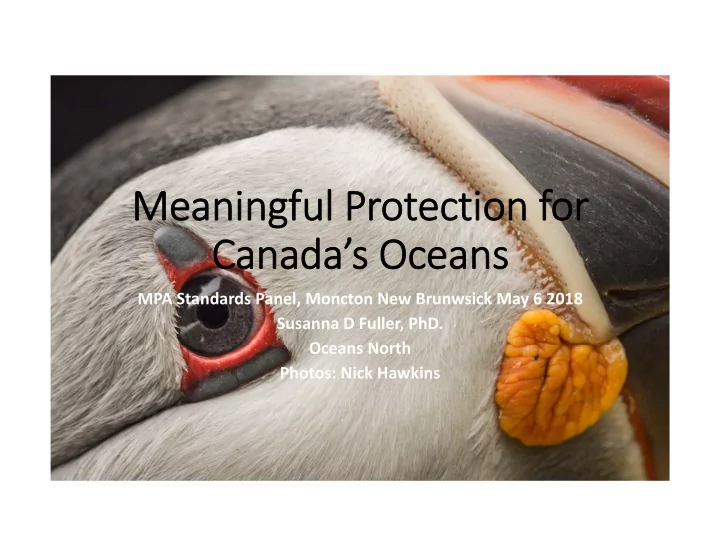

Meaningful Protection for Canada’s Oceans MPA Standards Panel, Moncton New Brunwsick May 6 2018 Susanna D Fuller, PhD. Oceans North Photos: Nick Hawkins
Context • Public concern regarding Laurentian Channel MPA & Oil and gas conflict • Ocean is increasingly under threat • Canada far behind on ocean protection, 3 ocean basins • Different biological, cultural, social and economic realities • Lack of experience makes progress challenging • Opportunity to set standards for protection and governance • Align existing Canadian tools for protection
Importance of Global Standards • IUCN Standards globally accepted • Challenge is implementation • Canada is an IUCN member • CBD process on Other Effective Conservation Measures • ICCA on governance for indigenous protections • Evaluation & measurement of effectiveness
Why Standards? • Increase certainty & reduce confusion • Reduce consultation time & regulatory reviews • Builds trust between stakeholders and upholds public trust • Allows for global mechanisms to assess effectiveness • Allows Canada to compare its efforts to others • Allows for meaningful science to be conducted • Focus can then be on governance & pervasive impacts (plastic, climate change, pollution, noise).
Industrial Activity • Prohibitions should include all industrial activity including: • Oil and gas exploration • Seabed mining • Destructive bottom fisheries • Open net pen aquaculture • Renewable energy • Consistent with terrestrial protection • Allowable activities should be low impact, support traditional use for near shore areas • Seek to grow new uses (tourism, recreation)
Conclusion • Achieving >10% protection should be doable (<90% of the rest of the marine environment still needs to be well managed) • Canada should lead in doing its job well / needs bona fides to be a global leader. • Canada’s ocean protection tools are not aligned. • Standards can help build trust, reduce uncertainty and fear. • Standards for allowable activities & governance mechanisms.
Canadian MPA Standards Should: 1. Be firmly based in globally accepted standards. 2. Restrict industrial activities in Canadian MPAs. 3. Strive to provide guidance needed on governance models for IPAs, ICCAs and bottom up processes for coastal MPAs. 4. Require alignment of Canadian law and policy framework & use Indigenous law for IPA, ICCA processes processes.
Recommend
More recommend